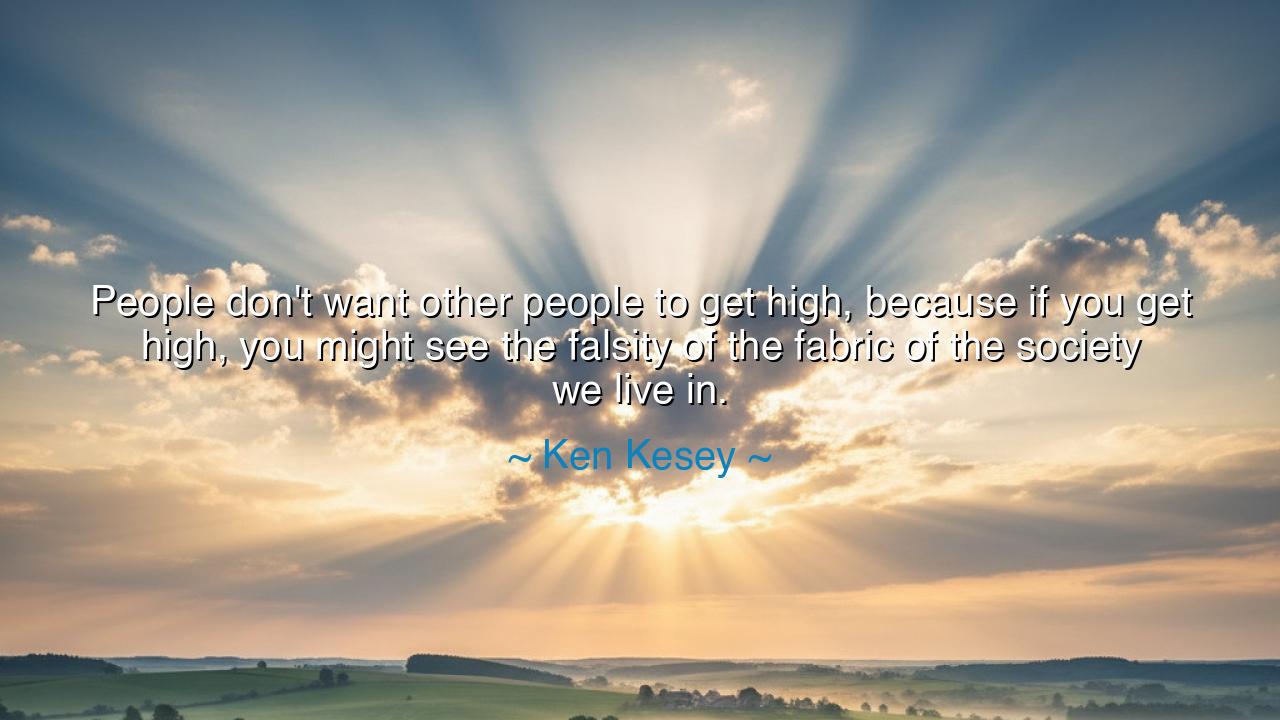
People don't want other people to get high, because if you get
People don't want other people to get high, because if you get high, you might see the falsity of the fabric of the society we live in.






Hear the voice of Ken Kesey, prophet of the counterculture and chronicler of rebellion, who declared: “People don’t want other people to get high, because if you get high, you might see the falsity of the fabric of the society we live in.” These words, sharp as a blade yet cloaked in mystery, are not only about the act of intoxication, but about awakening—the sudden tearing away of the veil that hides the illusions upon which civilizations often build themselves. For Kesey knew that when men and women glimpse beyond the ordinary, they begin to question the laws, customs, and truths that had seemed eternal.
What Kesey speaks of is the fear of awareness. Societies often weave a fabric of norms, expectations, and beliefs to hold themselves together. This fabric teaches people how to work, how to consume, how to obey, and how to find meaning within the order prescribed to them. But when someone steps outside of this pattern—through altered states, through art, through mystical vision—they may see that much of what was called natural is constructed, much of what was called truth is convenience, much of what was called justice is control. And once this vision is seen, it cannot be unseen.
Consider, O listeners, the fate of Socrates, who, without taking any substance, reached a state of perpetual questioning, unsettling Athens by showing the falsity in its pretenses of wisdom. The city, threatened by the power of his insight, condemned him to death, for his very presence tore holes in the fabric of society. Likewise, in Kesey’s time, those who sought transcendence through psychedelics were often met with fear and repression, not merely because of the substances themselves, but because of the danger that those awakened might refuse to march in the same lines as before.
History shows again and again that powers rooted in control distrust those who see differently. In Rome, the cults that offered ecstatic visions were treated with suspicion. In medieval Europe, mystics who claimed direct visions of God, outside of Church authority, were silenced or burned. And in the 20th century, the psychedelic revolution terrified governments, for those who touched altered states often questioned war, consumption, and blind obedience. Thus Kesey’s words reveal a timeless truth: society resists those who pierce its illusions, because illusion is often the glue that holds it together.
Yet let us not mistake Kesey’s message as a call merely to intoxication, but rather to awakening. To be “high” in his language is not only to alter the mind with substance, but to reach a higher perspective where the hidden structures of society are revealed. Art, meditation, poetry, philosophy—these too can raise us to such a height. The true danger lies not in vision, but in blindness; not in questioning, but in unthinking obedience to the patterns handed down without scrutiny.
The lesson, O seekers, is thus: do not fear the tearing of the veil. When you sense the falsity of the systems around you, do not turn away in fear, but look deeper. Ask questions. Challenge assumptions. And most of all, refuse to accept injustice simply because it is woven into the “fabric of society.” For only those who awaken can begin to reweave that fabric into something truer, fairer, and more enduring.
Therefore, in your own lives, strive to cultivate moments of vision. You need not flee to excess or intoxication to see clearly—seek truth through reflection, through dialogue, through the courage to step outside the expected path. And when others fear your vision, remember that their fear is proof of its power. For to see beyond illusion is the first step toward transformation.
Thus remember Kesey’s words: people fear others “getting high” because vision is dangerous to falsehood. Yet vision is also salvation. For when enough awaken, the fabric of society can be remade—not as a net of control, but as a tapestry of truth, justice, and freedom.






AAdministratorAdministrator
Welcome, honored guests. Please leave a comment, we will respond soon